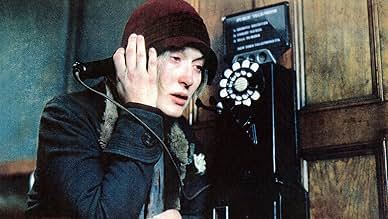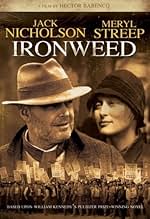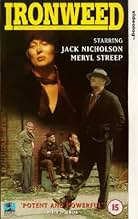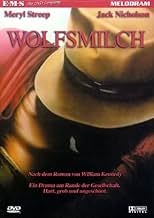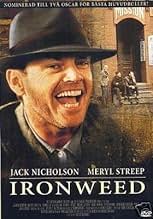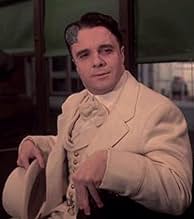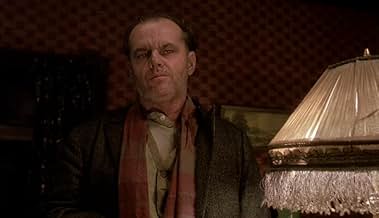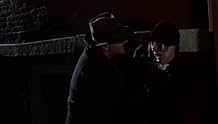An alcoholic drifter spends Halloween in his hometown of Albany, New York after returning there for the first time in decades.An alcoholic drifter spends Halloween in his hometown of Albany, New York after returning there for the first time in decades.An alcoholic drifter spends Halloween in his hometown of Albany, New York after returning there for the first time in decades.
- Nominated for 2 Oscars
- 2 wins & 4 nominations total
Featured reviews
I found this movie on DVD at my public library, I watched it at home.
The Great Depression in the USA lasted from 1929 to 1939. This movie is set in 1938 Albany, New York, near the end of the Depression but with most communities in a depressed economic state.
Jack Nicholson is Francis Phelan, a drifter who has been away from home for some years. He returns right at Halloween, he meekly looks up his wife and two young adult children, but he calmly states that he doesn't plan to stay.
His friend with benefits for some years is Meryl Streep as Helen, former singer and entertainer who now was a shell of her former self.
In a non-glamorous role Carroll Baker is Francis' faithful wife Annie Phelan, she is surprised when he shows up but treats him with compassion.
This is just a slice of life story, bums and drifters doing what they can to sometimes find a little work, maybe get a sandwich here or visit the soup kitchen there, find an abandoned car to sleep in for the night without freezing.
I didn't find the story itself very enjoyable, it is a tragic story, but I found it worthwhile for Nicholson and Streep.
The Great Depression in the USA lasted from 1929 to 1939. This movie is set in 1938 Albany, New York, near the end of the Depression but with most communities in a depressed economic state.
Jack Nicholson is Francis Phelan, a drifter who has been away from home for some years. He returns right at Halloween, he meekly looks up his wife and two young adult children, but he calmly states that he doesn't plan to stay.
His friend with benefits for some years is Meryl Streep as Helen, former singer and entertainer who now was a shell of her former self.
In a non-glamorous role Carroll Baker is Francis' faithful wife Annie Phelan, she is surprised when he shows up but treats him with compassion.
This is just a slice of life story, bums and drifters doing what they can to sometimes find a little work, maybe get a sandwich here or visit the soup kitchen there, find an abandoned car to sleep in for the night without freezing.
I didn't find the story itself very enjoyable, it is a tragic story, but I found it worthwhile for Nicholson and Streep.
There are many reasons why this film is a masterpiece, but the most significant element is surely Streep's portrayal of a homeless alcoholic in 1930's Albany. Her appearance, about half an hour into the film, is quite frankly, astonishing. She walks into a soup kitchen and sits down next to Nicholson and your jaw drops at the transformation. Beyond the technical virtuosity, you marvel at the choices that Streep makes that express the character so movingly, from the vocal production which is almost like a groan of pain, to the body language including her constantly averted glance and shuffling walk which express the woman's lost self esteem, to her bursts of rage when we see the glimmer of the spirit she once posessed. There's a scene in a bar in which she sings for the patrons that you will never forget.
Every other element of the film succeeds: the other performances (Nicholson, Tom Waits and Carol Baker stand out), the production design recreating a vanished era flawlessly without resorting to the phony perfection of say a Merchant Ivory film, the sound design which is surprisingly complex for such an intimate film, the screenplay, the cinematography, the direction. How is it that Hector Babenco has only made two films since this one?
Every other element of the film succeeds: the other performances (Nicholson, Tom Waits and Carol Baker stand out), the production design recreating a vanished era flawlessly without resorting to the phony perfection of say a Merchant Ivory film, the sound design which is surprisingly complex for such an intimate film, the screenplay, the cinematography, the direction. How is it that Hector Babenco has only made two films since this one?
Never the timing for a movie had been so disastrous.Released in those "glorious " eighties when the success stories and the triumphalist heroes were the golden rule,"Ironweed" stood no chance at all.Two tramps did not fit well in the movie landscape of those "feel good" times.And two tramps played by two megastars ,it was unforgivable!
The cast is stellar,but it's Meryl Streep whom I will remember FOREVER.When she sings her little tune "he's me pal" she's so heart-wrenching that she will move you to tears."At least ,I didn't betray anybody" she said.Although it was a colossal flop,Streep would only approach such an emotion afterwards.(notably in "the bridges of Madison County")Nicholson was equally courageous to play such a demeaning part,and he gets strong support from Carroll Baker who proves here she can age gracefully and from Tom Waits ,ideally cast as a barfly.
"Ironweed" is very hard to see nowadays.One of these days ,it will be given the place it deserves.
The cast is stellar,but it's Meryl Streep whom I will remember FOREVER.When she sings her little tune "he's me pal" she's so heart-wrenching that she will move you to tears."At least ,I didn't betray anybody" she said.Although it was a colossal flop,Streep would only approach such an emotion afterwards.(notably in "the bridges of Madison County")Nicholson was equally courageous to play such a demeaning part,and he gets strong support from Carroll Baker who proves here she can age gracefully and from Tom Waits ,ideally cast as a barfly.
"Ironweed" is very hard to see nowadays.One of these days ,it will be given the place it deserves.
Have you ever wondered what's it's like to be homeless? To most of us, it's as foreign an existence as the medieval world of Hugh Capet. And yet, it's a way of life that's within reach of all of us. And I'm not talking about its physical proximity, about the unfortunates we pass on the streets with their bed rolls on their backs: on the contrary, I'm referring to its spiritual, psychological proximity, to all the rest of us, who, given the right circumstances, could give up on our cheery Western materialist society and wander off into the shadows.
Ironweed takes its viewers into that shadowy world of the rail yards, cardboard shantytowns, underpasses, and abandoned automobiles, and shows us incisive glimpses of how a person arrives there. Featuring what I think are the very best performances by Jack Nicholson and Meryl Streep, Ironweed gets us deep into the sooty, grimy, bilious skin of the two `hobos.' Like Schindler's List, Ironweed is dark poetry. When the movie is over, you're haunted for days by the imagery.
Set in Albany during the Great Depression, Ironweed delivers not an ounce of moralizing. It's like a clinical exposition of the homeless person's entire life, both from without, and within. On the outside, of course, there's the Depression: a society doing the best it can to get by. From the `hobo's' point of view, one feels the implicit violence of a culture taught to view others as economic instruments of their own survival. The homeless, of course, are on the bottom end of the food chain. On the inside, Ironweed takes us into the intense pain of dashed hopes and expectations. From within and without, the homeless are caught in a whirling vortex that only grinds them down deeper and deeper into despair, the type that Kierkegaard's describes in `Sickness unto Death.' It's where intense poverty is not just physical, but spiritual.
This is a terrific movie; but, it's not for the faint of heart.
Ironweed takes its viewers into that shadowy world of the rail yards, cardboard shantytowns, underpasses, and abandoned automobiles, and shows us incisive glimpses of how a person arrives there. Featuring what I think are the very best performances by Jack Nicholson and Meryl Streep, Ironweed gets us deep into the sooty, grimy, bilious skin of the two `hobos.' Like Schindler's List, Ironweed is dark poetry. When the movie is over, you're haunted for days by the imagery.
Set in Albany during the Great Depression, Ironweed delivers not an ounce of moralizing. It's like a clinical exposition of the homeless person's entire life, both from without, and within. On the outside, of course, there's the Depression: a society doing the best it can to get by. From the `hobo's' point of view, one feels the implicit violence of a culture taught to view others as economic instruments of their own survival. The homeless, of course, are on the bottom end of the food chain. On the inside, Ironweed takes us into the intense pain of dashed hopes and expectations. From within and without, the homeless are caught in a whirling vortex that only grinds them down deeper and deeper into despair, the type that Kierkegaard's describes in `Sickness unto Death.' It's where intense poverty is not just physical, but spiritual.
This is a terrific movie; but, it's not for the faint of heart.
Cold, desolate in the surface and an uncomfortable warmth in the inside. Meryl Streep leads in a way that is difficult to explain. She provides a truly magic movie moment when she sings "He's My Pal" for her supper. For a moment we live her fantasy. Her moment is our moment, that's why as the song and the fantasy ends something inside me cracked. I felt tears running down my face and, I swear, I wasn't ready for that. The humanity of Meryl Streep, the actress, filters through the devastating circumstances of her character. Circumstances that, by the time we meet her, are already a way of life. At the beginning of the film, when somebody asks her how is she, her reply is "Delightful". Trying to adjust to this character I listen to her stained, tired voice, trying to be heard and I did, heard her. I love Meryl Streep.
Did you know
- TriviaArgentinean director Hector Babenco said of this picture: "It is a movie that tries to embrace the territories of love, and it's also about the courage and beauty of people we don't usually think of as having deep and complex emotions."
- GoofsAs the trolley being driven by the scab played by Nathan Lane approaches the union protesters, there are no trolley tracks between the mob and the trolley. In the next shot, they suddenly appear in the dirt under young Francis' feet.
- SoundtracksWhe You Were Sweet Sixteen
Words and Music by James Thornton
- How long is Ironweed?Powered by Alexa
Details
Box office
- Budget
- $27,000,000 (estimated)
- Gross US & Canada
- $7,393,346
- Opening weekend US & Canada
- $36,973
- Dec 20, 1987
- Gross worldwide
- $7,393,346
- Runtime
- 2h 23m(143 min)
- Color
- Sound mix
- Aspect ratio
- 1.85 : 1
Contribute to this page
Suggest an edit or add missing content


